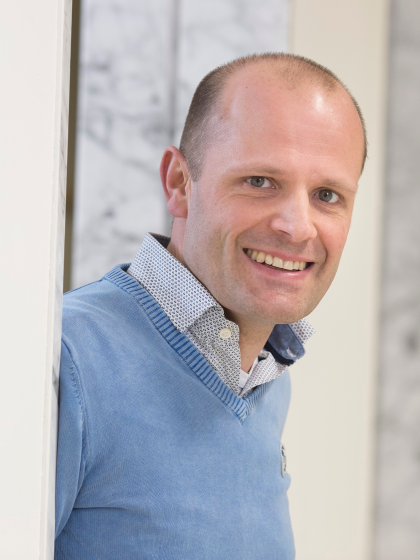
prof. dr. M. (Michiel) Rienstra

Research interests
Michiel Rienstra graduated in medicine (cum laude) at the University of Antwerp, Belgium in 2003, graduated master of health administration in 2021 at TIAS School for Business and Society, The Netherlands. Obtained a PhD at the University of Groningen, The Netherlands in 2007 on Atrial Fibrillation, Underlying Disease and Prognosis. He completed his cardiology training at the University Medical Center Groningen in 2012, followed by training as device cardiologist, where continued working as clinical cardiologist and researcher. He is a Professor of Clinical Cardiology at the University of Groningen, past-Clinical Director of the Department of Cardiology, and cardiologist at the University Medical Center Groningen, specialized in AF, devices and advanced HF. He combines treatment of patients with arrhythmias and HF with clinic-oriented AF and HF research. He is founder of the regional network HeartNet Northern-Netherlands (since 2018) aiming to integrate care and value-based heath care for inhabitants at risk and patients with cardiovascular diseases in the 2 Northern provinces of the Netherlands. Stakeholders of the network are patient organisations, cardiologists, general practitioner cooperation’s, and health insurance companies. His research consists of conducting investigator-initiated clinical studies to improve AF or HF treatment (steeringcie/principal investigator of RACE I to V, CONVERT, VIP-HF, MARC, DECISION, RACE 7-ACWAS, DUTCH-AF), studying epidemiology of AF and its risk factors (including HF) in PREVEND, Lifelines and Framingham Heart Study, uncovering the genetics of AF in part with the AFGen international consortium (contributor since NWO-Rubicon fellowship in Boston), and applying novel bioinformatics tools to improve AF risk prediction using biobanks of AF patients (AF-Risk, Biomarker-AF, Young-AF). He was awarded with a NWO-VENI grant for a project on genetics of AF, followed by European Society of Cardiology academic grant for a project on a big data approach in AF. He is involved in several national consortia (Cardiovascular Research Netherlands - CVON): CVON-RACE V (hypercoagulability and AF progression), CVON-RED-CVD (early detection of cardiovascular disease in general practices), and CVON-AI (Catalyzing the application of Artificial Intelligence for Cardiovascular Research Netherlands), and co-PI of the DECISION (Digoxin Evaluation in Chronic Heart Failure: Investigational Study in Outpatients in the Netherlands), and steering committee member of numerous investigator-initiated studies (RACE 8, RACE 9, MARC 2 and CABA-HFPEF). He is PI of the national AF-network EmbRACE in the Netherlands. He is fellow of the European Society of Cardiology and the American Heart Association. He is research coordinator for the European Society of Cardiology 2024 guidelines on management of AF.
Research consists of conducting clinical studies and trials to improve AF treatment, also in the setting of HF; studying the epidemiology of AF and its risk factors (with emphasis on HF) in PREVEND, Lifelines; uncvering the genetics of AF within the international AFGen/TOPMED consortia; and applying bioinformatics/machine learning/artificial intelligence tools to improve AF risk prediction.
